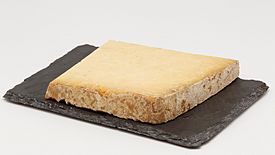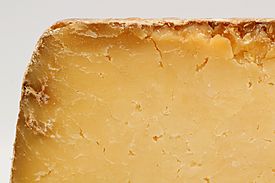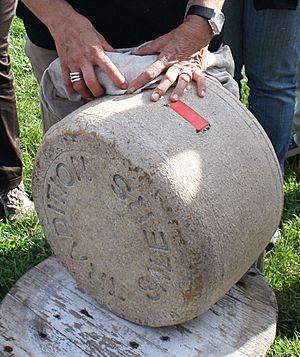Salers cheese facts for kids
Quick facts for kids Salers |
|
|---|---|
 A rectangular cut of Salers  Close-up view of the rind and texture of Salers |
|
| Country of origin | France |
| Region, town | Auvergne, Salers |
| Source of milk | Cow |
| Pasteurised | No |
| Texture | Semi-hard |
| Aging time | Minimum of 3 months, and up to 45 months |
| Certification | French AOC 1961 |
| Named after | Lua error in Module:Wikidata at line 70: attempt to index field 'wikibase' (a nil value). |
Salers (French: Le Salers) is a special kind of semi-hard cheese from France. It comes from a volcanic area called the Cantal mountains in Auvergne, central France. This cheese is made from the milk of Salers cows.
Salers cheese is made by pressing it, but it is not cooked. It is often made between April 15th and November 15th. The cheese is shaped like a big circle and can weigh around 40 kilograms (about 88 pounds)! After it's made, the cheese is aged in cool caves. These caves are kept at temperatures between 6 and 12 degrees Celsius (43–54 °F). The cheese ages for at least 3 months, but some can age for up to 45 months.
Tradition Salers Cheese
There is a special type called Salers de Buron Traditional. This cheese is only made during the summer months. It is produced in stone huts called burons in the Auvergne region. For this special cheese, only milk from the Salers cow is used. It must also be made in a traditional wooden container called a gerle. This cheese is often best to eat between September and March. It usually ages for about nine months, but it is also delicious all year round.
History of Salers Cheese
Salers cheese has been made for a very long time. People believe it has been produced in this region for at least 2,000 years!
The cheese became famous when a French general, Henri de La Ferté-Senneterre, served it. He offered it to Louis XIV of France, who was a king. Senneterre also helped introduce other famous French cheeses like Saint-Nectaire and Cantal cheese.
Since 1961, Salers cheese has had a special label called AOC. This label means the cheese is made in a specific way and place. It helps protect its quality and tradition.
Today, there are not many traditional Salers producers left. Fewer than 100 farms still make this cheese in the old way. In 1998, about 1,112 tonnes of Salers cheese were made. All of it was produced on local farms using milk that was not pasteurized.
Salers and Cantal Cheese
Salers cheese is quite similar to Cantal cheese. Both cheeses are made from the milk of the same cows. The main difference is what the cows eat. Salers cheese is made when the cows eat fresh grass in the fields. Cantal cheese is made when the cows eat hay during the other months of the year.
See also
 In Spanish: Salers (queso) para niños
In Spanish: Salers (queso) para niños
 | Isaac Myers |
 | D. Hamilton Jackson |
 | A. Philip Randolph |


